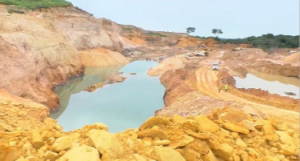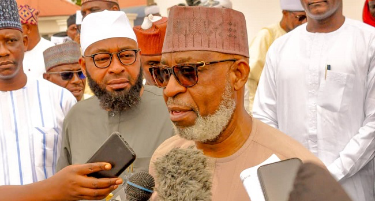In a decisive move to enhance the safety and well-being of mine workers, the Federal Government has announced that mining companies will now be required to provide insurance coverage for all their employees to protect them in the event of accidents.
This announcement was made by the Minister of Solid Minerals Development, Dele Alake, during a condolence visit to Niger State following a tragic mining pit collapse in the Galkago community of Shiroro Local Government Area.
The Minister’s visit to Niger State, where he was received by Governor Umaru Bago, highlights the government’s commitment to addressing the safety concerns in the mining sector. During his meeting with the governor, Minister Alake outlined new regulatory measures aimed at preventing future tragedies.
He stated that the Federal Government will no longer approve any mining licenses unless they include a comprehensive remediation plan for the mine site. Additionally, there will be a thorough revision of the environmental impact assessment procedures required for the issuance of mining licenses, ensuring that they are more rigorous and effective.
Governor Bago took the opportunity to highlight the broader implications of mining activities in the state. He noted that the rich deposits of mineral resources in Shiroro and Munya Local Government Areas have contributed significantly to the region’s high levels of insecurity.
The governor called for a detailed census of licensed miners to ensure proper regulation and oversight. He emphasized the need to regulate harmful mining practices that pose risks to both workers and the environment, advocating for stricter enforcement of safety standards.
Following their meeting, Governor Bago escorted Minister Alake to the IBB Specialist Hospital, where some of the victims rescued from the collapsed mining pit are receiving medical treatment.
This visit provided the Minister with a firsthand view of the tragic consequences of the mining accident and the urgent need for improved safety measures. They also met with traditional leaders from the affected community at the government house to discuss ongoing rescue efforts and community concerns.
The mining pit collapse, which occurred on a Monday, resulted in at least 30 people being trapped, according to the state’s emergency management agency. Despite five days of rescue operations, efforts to save those trapped have been severely hampered by constant rainfall and the challenging security situation in the area. The dire conditions have highlighted the urgent need for better preparedness and response strategies for such emergencies.
This incident has brought to the forefront critical issues surrounding mining activities in Nigeria. The government’s new directives aim to prevent such tragedies in the future by ensuring that mining companies take greater responsibility for the safety and welfare of their workers. The requirement for insurance coverage is a significant step towards providing financial protection for miners and their families in case of accidents.

Moreover, the insistence on concrete remediation plans and stringent environmental impact assessments for new mining licenses underscores the government’s commitment to sustainable and responsible mining practices.
These measures are expected to mitigate the environmental degradation often associated with mining and ensure that communities are not left to deal with the aftermath of mining activities alone.
The call for a census of licensed miners and stricter regulation of mining practices reflects a broader strategy to address the root causes of insecurity in mining areas. By identifying and monitoring all active mining operations, the government hopes to reduce illegal mining activities that often exacerbate local tensions and contribute to unsafe working conditions.
As the Federal Government and the Niger State government continue to respond to this disaster, the focus remains on the ongoing rescue operations and providing support to the victims and their families.
The recent announcements are part of a larger effort to reform the mining sector, ensuring that it operates safely, sustainably, and in a way that benefits all stakeholders involved.
The unfolding situation in Galkago community serves as a stark reminder of the risks associated with mining and the urgent need for comprehensive reforms. The government’s proactive measures are a crucial step in the right direction, aiming to safeguard the lives of mine workers and promote a more secure and sustainable mining industry in Nigeria. These changes will not only protect the workers but also contribute to the overall development and stability of the mining regions.




